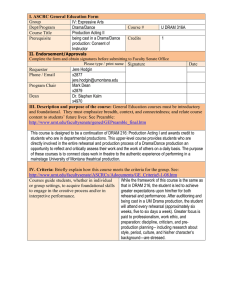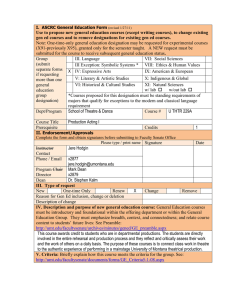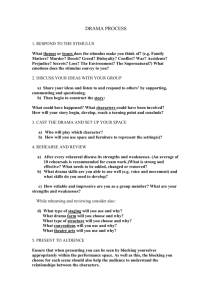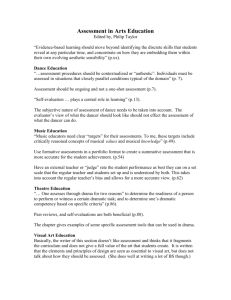I. ASCRC General Education Form IV: Expressive Arts Group Drama/Dance
advertisement
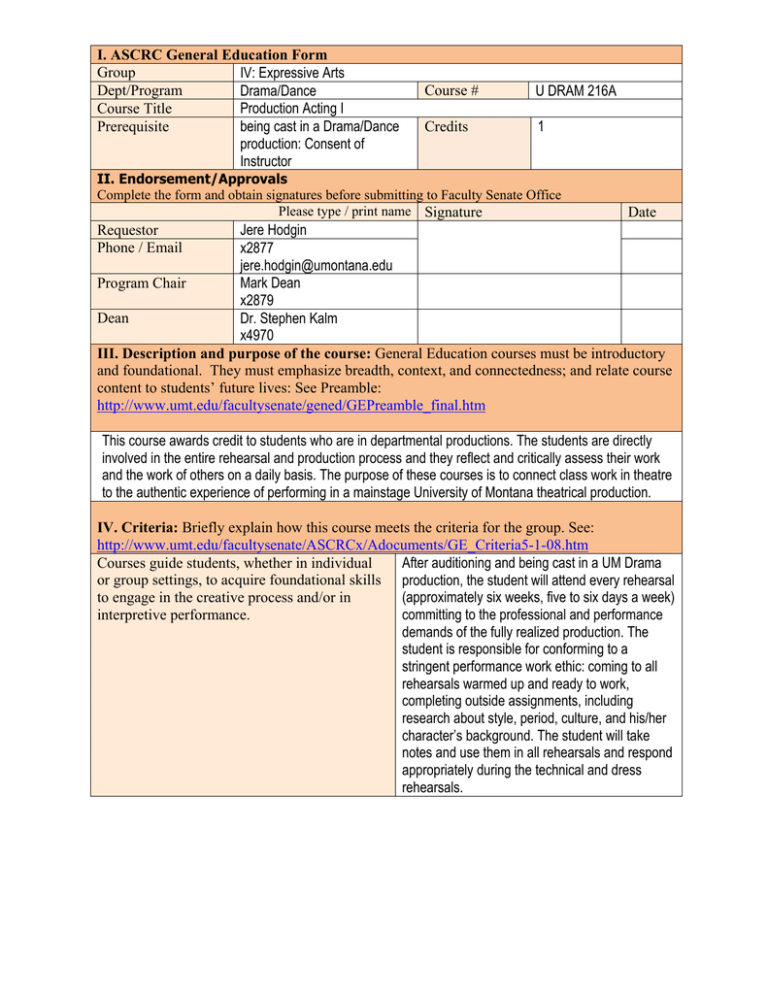
I. ASCRC General Education Form Group IV: Expressive Arts Dept/Program Drama/Dance Course Title Production Acting I Prerequisite being cast in a Drama/Dance production: Consent of Instructor Course # U DRAM 216A Credits 1 II. Endorsement/Approvals Complete the form and obtain signatures before submitting to Faculty Senate Office Please type / print name Signature Date Jere Hodgin x2877 jere.hodgin@umontana.edu Program Chair Mark Dean x2879 Dean Dr. Stephen Kalm x4970 III. Description and purpose of the course: General Education courses must be introductory and foundational. They must emphasize breadth, context, and connectedness; and relate course content to students’ future lives: See Preamble: http://www.umt.edu/facultysenate/gened/GEPreamble_final.htm Requestor Phone / Email This course awards credit to students who are in departmental productions. The students are directly involved in the entire rehearsal and production process and they reflect and critically assess their work and the work of others on a daily basis. The purpose of these courses is to connect class work in theatre to the authentic experience of performing in a mainstage University of Montana theatrical production. IV. Criteria: Briefly explain how this course meets the criteria for the group. See: http://www.umt.edu/facultysenate/ASCRCx/Adocuments/GE_Criteria5-1-08.htm Courses guide students, whether in individual After auditioning and being cast in a UM Drama or group settings, to acquire foundational skills production, the student will attend every rehearsal to engage in the creative process and/or in (approximately six weeks, five to six days a week) interpretive performance. committing to the professional and performance demands of the fully realized production. The student is responsible for conforming to a stringent performance work ethic: coming to all rehearsals warmed up and ready to work, completing outside assignments, including research about style, period, culture, and his/her character’s background. The student will take notes and use them in all rehearsals and respond appropriately during the technical and dress rehearsals. In consultation with the play’s director and the students’ professors, the faculty advisor assesses each participating student’s depiction of character within the play. Particular attention is paid to the students’ effort, developed talent and growth, and their professional work ethic. Further attention is devoted to how the skills developed in drama classes are being used in the productions and how the student is able to transition from a focus on process to a focus on product. The students discuss these concepts with their advisors and the production’s director. V. Student Learning Goals: Briefly explain how this course will meet the applicable learning goals. See: http://www.umt.edu/facultysenate/ASCRCx/Adocuments/GE_Criteria5-1-08.htm Upon completion of this perspective, students The performance of a role within a production will be able to express themselves in the making provides the student with the unique opportunity of an original work or creative performance. to perform the role before multiple audiences. Productions in Drama/Dance consist of at least five live performances, with some consisting of as many as twelve thus providing diverse and rich opportunities for expression and creativity. Through direct experience (for example, attendance and involvement with live performance, exhibitions, workshops, and readings), students will engage in critical assessment of their own work and the work of others. Student actors in the productions take part in an audience “talkbacks” where they are asked to articulate their understanding of the show and its place in our society. This is done at the end of the performance the first Friday of the show’s run. Students also meet with the faculty and are asked to discuss the relevance of the production to their development as students and performers. Upon completion of this perspective, students All students who perform in productions hold will be able to critique the quality of their own individual meetings with at least two faculty work and that of others. members to discuss their work and to critically assess the production and their own skills set. VII. Syllabus: Paste syllabus below or attach and send digital copy with form. ⇓ The syllabus should clearly describe how the above criteria are satisfied. For assistance on syllabus preparation see: http://teaching.berkeley.edu/bgd/syllabus.html Upon completion of this perspective, students will be able to understand the genres and/or forms that have shaped the medium. DRAMA 216A Production Acting Autumn 2008 Aim: The purpose of this course is to connect class work in theatre to the authentic experience of performing in a main-stage University of Montana theatrical production. Outcomes: At the end of the semester the student will be able to: Implement theories, techniques and strategies into practice; Make use of specific theatrical terminology while acting on the stage; Identify problem areas and take such areas back to their professor and classes for future work; Listen and respond appropriately to notes given by the director; Describe their own creative approach to role; and, Gain a sense of professionalism and ensemble; Content: After auditioning and being cast in a UM Drama production, the student will attend every rehearsal (approximately 6 weeks, five-six days a week) on time and ready to work. The student is responsible for coming to all rehearsals warmed-up and ready to work, having done much outside homework and preparation, including research about style, period, culture, and character’s background. The student will take all notes and use them in all rehearsals and respond appropriately during the technical and dress rehearsals. The actors will perform at least five full runs of the play for general public audiences and met with their professors after the run of the show for personal feedback and notes. Assessment: In consult with the play’s director and the student’s professors the faculty advisor will assess the work based on the student’s effort, developed talent and growth and their professional work ethic. Departmental Handbook: • All Drama/Dance students must have an in-depth knowledge of the practices and procedures outlined in the Department of Drama/Dance Handbook. The Handbook is available online at http://www.sfa.umt.edu/drama/index.html. Academic Misconduct and the Student Conduct Code: • All students must practice academic honesty. Academic misconduct is subject to an academic penalty by the course instructor and/or disciplinary sanction by the University. All students need to be familiar with the Student Conduct Code. The Code is available for review online at www.umt.edu/SA/VPSA/Index.cfm/page/1321. *Please note: As an instructor of a general education course, you will be expected to provide sample assessment items and corresponding responses to the Assessment Advisory Committee.
